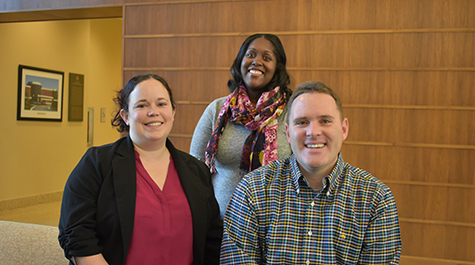Thriving School Psychology Program achieves NASP accreditation
Like many other K-12 school-based professions, there is a nationwide shortage of school psychologists. The W&M School of Education is working to fill the gap, though, reaching record enrollments for each of the past four years in its School Psychology Program.
The National Association of School Psychologists (NASP) recommends a ratio of no more than 1,000 students per school psychologist. However, the nationwide average is nearly 1,400 to 1, with particularly dire shortages in rural and other underserved areas.
“I knew I wanted to help children, but I wanted to be able to provide my expertise in various areas,” says Michaela Schulze, a second-year student in the program. “I didn't want to just identify the area of concern that may be hindering their education, I also wanted to provide them with the necessary skills and resources in order to excel.”
School psychologists provide vital services to school communities, primarily working to assess the learning needs of students who are struggling and developing individualized interventions to support their growth. School psychologists also work with school colleagues, families and communities on broader initiatives that promote mental health and create safe school climates.
This summer, William & Mary’s School Psychology Program achieved an important accolade: full accreditation by NASP, which distinguishes the program as having met the highest measures of quality for the profession.
Ryan McGill, assistant professor of school psychology, has led the program since his arrival at William & Mary in 2016 and was integral in revising the program to ensure it met NASP's stringent guidelines for quality.
“It’s due to the excellent leadership of the department, and specifically to Ryan, that the program has met this goal,” says Spencer Niles, dean of the School of Education. “Ryan brought a compelling vision for the program that combined the academic excellence of William & Mary with strong practical field experiences and rigorous research in the discipline.”
Two additional faculty members rounded out the program with the hires of Janise Parker in 2017 and Leandra Parris in 2019 as assistant professors of school psychology. Both of these scholars brought significant research experience to the program, focusing on topics including student engagement and motivation, culturally responsive practices in school psychology, crisis response and trauma-informed practices, and the impact of social media on psychosocial functioning.
“The dedication and support of the faculty really distinguishes the William & Mary School Psychology Program,” says Schulze. “The thing that I have enjoyed most about this program is getting to work closely with Dr. McGill and Dr. Parker. They have both taught me a lot about school psychology thus far and have provided me with many opportunities outside of the curriculum to apply my knowledge.”
The three-year program emphasizes practical experiences in the field, with students observing and shadowing professionals from their first year with field work embedded into their courses. In the second year, a formal practicum places students in school sites for approximately 2.5 days per week. The third year is a full-time (typically paid) internship, with field supervisors and faculty working together to provide ongoing feedback to the student. Students graduate with both a master’s and educational specialist degree, and the knowledge and skills to achieve licensure as a school psychologist.
Parker acts as practicum coordinator, developing and sustaining the partnerships with local school divisions that enable students to engage in meaningful field experiences throughout their degree program. Through her efforts to expand school-university partnerships, students have a deep and diverse set of experiences by the time they graduate.
“Students in our program get the best of both worlds — world-class faculty who are making scholarly contributions that rival that of any institution, as well as the personalized attention and support that ensures they are fully prepared and confident to serve students in schools after they graduate,” says McGill. “And we faculty get to work with world-class students.”
McGill cites the 100% job placement rate among recent graduates as a sign of both the excellence of the program and the high need for talented school psychologists. The incoming class in 2019 was the program’s largest in recent years, with 14 new students enrolling.
“I think the difference between W&M and other programs is the plentiful opportunities we receive here that we might not have gotten elsewhere,” says Katie Mauro, a second-year student in the program. “We’re able to take special education courses with professors in the Curriculum & Instruction department, pursue research opportunities, and have meaningful experiences in public schools.”
William & Mary’s program is one of just five institutions in Virginia holding NASP accreditation.
“This accreditation signals to students and peers that we’re meeting national standards and training school psychologists at the highest level,” says McGill. “We’ve worked hard to ensure our curriculum and fieldwork meet those standards and provide students the best experience possible. We’re proud of this achievement, but even more proud to see graduates of our program heading into the field to make a real impact in the lives of students and schools.”
